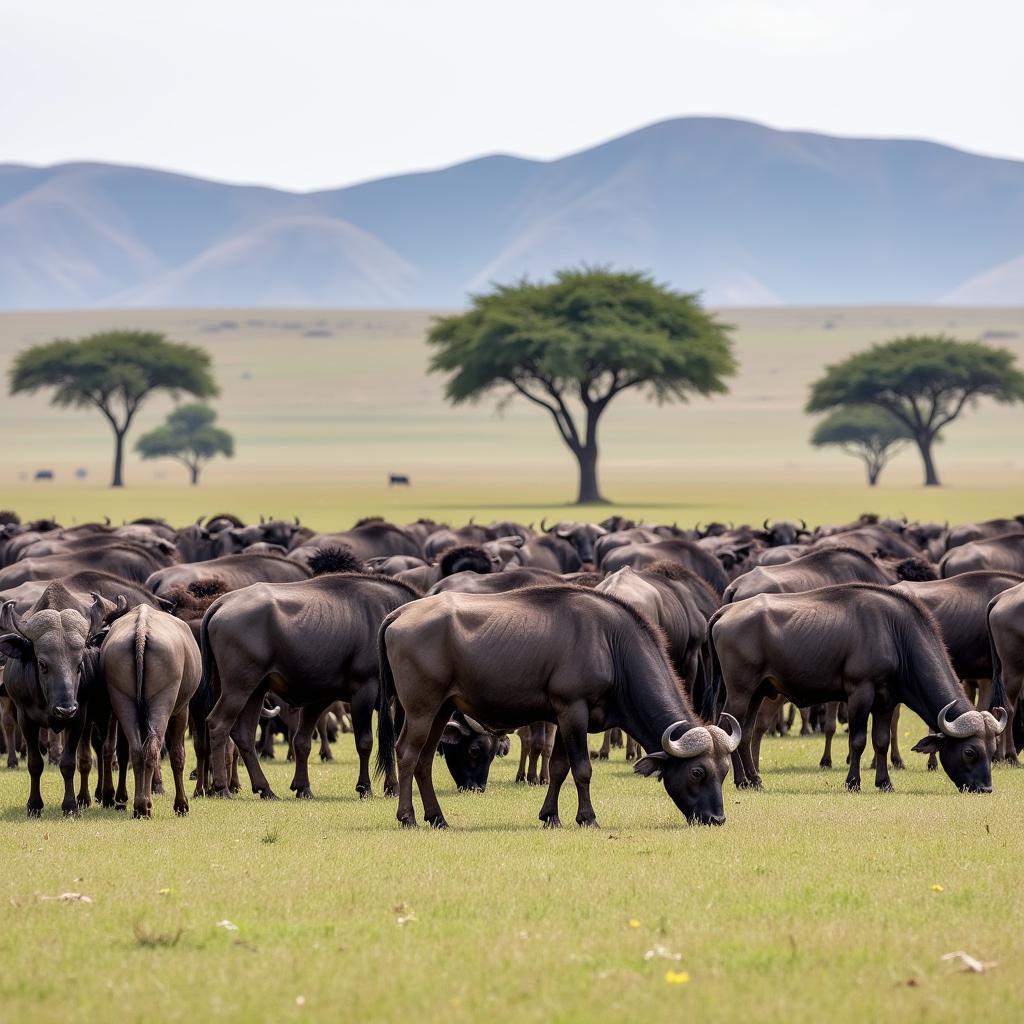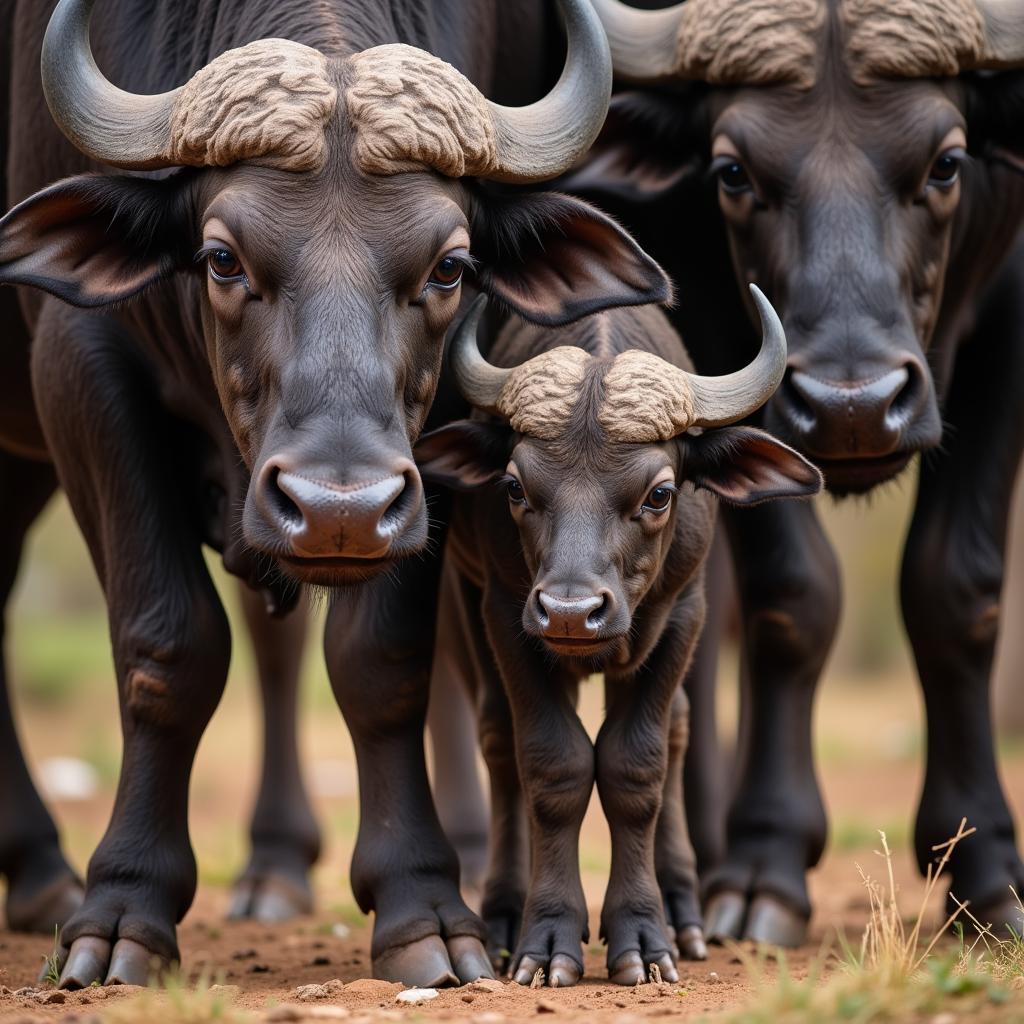African Buffalo Masai Mara: A Majestic Symbol of the Savannah
The African Buffalo Masai Mara, a creature of formidable presence and complex social dynamics, roams the vast plains of the Masai Mara National Reserve. These iconic bovines are a crucial part of the ecosystem and a thrilling sight for any safari-goer. This article delves into the fascinating world of the African buffalo in the Masai Mara, exploring their behavior, habitat, and significance in this iconic African landscape.
Witnessing a herd of African buffalo thundering across the Masai Mara is an unforgettable experience. Their sheer size and power are awe-inspiring, and their complex social structures offer a glimpse into the intricate web of life on the savannah. But there’s much more to these creatures than meets the eye. From their role in shaping the landscape to their interactions with predators, the African buffalo plays a vital role in the Masai Mara ecosystem. You might even consider an African buffalo safari to experience this firsthand.
Understanding the African Buffalo in the Masai Mara
The African buffalo, scientifically known as Syncerus caffer, is one of the “Big Five” and a highly sought-after sighting on safari. In the Masai Mara, they thrive in large herds, sometimes numbering in the hundreds or even thousands. These herds provide protection against predators like lions, leopards, and crocodiles, demonstrating the power of collective security in the wild. Their social structure is matriarchal, with older females leading the herd and making crucial decisions about grazing and movement.
The Masai Mara provides an ideal habitat for the African buffalo. The vast grasslands offer ample grazing opportunities, and the Mara River provides a vital water source. The diverse landscape, with its mix of open plains, woodlands, and riverine forests, caters to their various needs, from foraging to shelter.
 African Buffalo Herd in the Masai Mara
African Buffalo Herd in the Masai Mara
What do African Buffalo eat in the Masai Mara?
The African buffalo in the Masai Mara are herbivores with a diet primarily consisting of grasses. Their large size and robust digestive systems allow them to consume large quantities of vegetation, playing a vital role in shaping the grassland ecosystem. They are selective grazers, preferring specific types of grasses depending on availability and nutritional content.
Their grazing habits also influence the landscape, helping to maintain the balance between grasses and other vegetation. They create pathways and open areas, which in turn can benefit other herbivores and contribute to the overall biodiversity of the ecosystem. For more information on African wildlife, check out 5k African wildlife.
The Role of the African Buffalo in the Ecosystem
African buffalo are keystone species in the Masai Mara, meaning their presence has a significant impact on the entire ecosystem. Their grazing patterns influence vegetation growth, and their dung provides nutrients for the soil, supporting a wide range of plant and insect life. They also serve as a crucial food source for large predators, contributing to the delicate balance of the food chain.
Their presence also influences other herbivores. By grazing on taller grasses, they create opportunities for smaller grazers to access shorter, more nutritious vegetation. This intricate interplay highlights the interconnectedness of life in the Masai Mara. Looking for exceptional wildlife viewing opportunities? Consider exploring African hot sites.
“The African buffalo is a true symbol of resilience and strength. Their ability to thrive in such a challenging environment is a testament to their adaptability and social cohesion,” observes Dr. Anika Moti, a wildlife biologist with over 20 years of experience studying the Masai Mara ecosystem.
Threats to African Buffalo Populations
While African buffalo are relatively abundant in the Masai Mara, they still face threats. Habitat loss due to human encroachment, disease outbreaks, and poaching are among the key challenges to their long-term survival. Conservation efforts are crucial to protecting these magnificent creatures and ensuring their continued presence in the Masai Mara. Interested in African safaris? Consider African beast safaris.
The Future of the African Buffalo in the Masai Mara
The future of the African buffalo in the Masai Mara depends on continued conservation efforts and sustainable management of the ecosystem. Protecting their habitat, mitigating disease outbreaks, and combating poaching are essential for their long-term survival. The African bush elephant big 5 safari can offer insights into conservation efforts.
 African Buffalo Calf in the Masai Mara
African Buffalo Calf in the Masai Mara
“Preserving the African buffalo is not just about protecting a single species. It’s about safeguarding the entire ecosystem and the intricate web of life that depends on it,” states Dr. Joseph Otieno, a leading conservationist in Kenya.
In conclusion, the African buffalo Masai Mara represents the raw beauty and untamed spirit of the African savannah. These magnificent creatures play a vital role in the Masai Mara ecosystem, and their presence enriches the landscape for both wildlife and visitors alike. Continued conservation efforts are crucial to ensuring their future generations continue to roam the plains of this iconic African reserve.
FAQ
- What is the average lifespan of an African buffalo? Around 20 years in the wild.
- Are African buffalo dangerous? Yes, they are powerful and can be aggressive, especially when threatened.
- What is the biggest threat to African buffalo? Habitat loss, disease, and poaching.
- How large can an African buffalo herd get? Herds can number in the hundreds or even thousands.
- What is the social structure of African buffalo? Matriarchal, led by older females.
- What do African buffalo eat? Primarily grasses.
- Where can I see African buffalo in the Masai Mara? Throughout the reserve, particularly near water sources and open grasslands.
Need assistance planning your African adventure? Contact us!
Phone: +255768904061
Email: [email protected]
Address: Mbarali DC Mawindi, Kangaga, Tanzania
We have a 24/7 customer service team.

